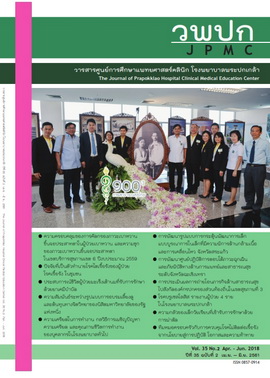Family Care Team and Non-Communicable Disease Control: from Policy to Practice, Opportunities and Challenges
Main Article Content
Abstract
Non-communicable diseases have always been a threat to Thai people and have become increasingly more severe. Family care teams are new hopes for the country in solving the problem according to family medicine principles based on family care. Support for family care places emphasis on family health volunteers who play the major role in caring for patients and coordinating with the family care team in treatment, prevention, health promotion and rehabilitation. This is implementation of integrated prevention policy by integrating health social sciences and holistic care to jointly work with the multidisciplinary team in the practice of sustainable non-communicable disease control.
Article Details
Section
Special Article
References
1. Rotheram-Borus MJ, Tomlinson M, Davis E. "Boring" family routines reduce non-communicable diseases: a commentary and call for action. Arch Public Health 2015; 73:1-5.
2. World Health Oganization. Noncommunicable diseases fact sheet [Internet]. 2017 [cited 2017 Jan 23]. Available from: https:// www.who.int/mediacentre/factsheets/fs355/en
3. Thai People’s Health. Thai health report 2017. Nakhon Pathom: Institute for Population and Social Research, Mahidol University; 2017.
4. Bureau of Non Communicable Diseases. Quality NCD clinic manual, fiscal year 2016. Nonthaburi: Department of Disease Control; 2016.
5. Health Administration Division. Family care team. Bangkok: The Agricultural Co-operative Federation of Thailand; 2014.
6. Health Administration Division. Guidelines of primary care cluster for service units. Nontaburi: Ministry of Public Health; 2014.
7. Garcia-Huidobro D, Mendenhall T. Family oriented care: opportunities for health promotion and disease prevention. J Fam Med Dis Prev 2015; 1-6.
8. García-Huidobro D, Puschel K, Soto G. Family functioning style and health: opportunities for health prevention in primary care. Br J Gen Pract 2012; 62(596):e198-203.
9. Pereira MG, Berg-Cross L, Almeida P, Machado JC. Impact of family environment and support on adherence, metabolic control, and quality of life in adolescents with diabetes. Int J Behav Med 2008; 15:187-93.
10. McClellan CB, Cohen LL. Family functioning in children with chronic illness compared with healthy controls: a critical review. J Pediatr 2007; 150:221-3.
11. Baig AA, Benitez A, Quinn MT, Burnet DL. Family interventions to improve diabetes outcomes for adults. Ann N Y Acad Sci 2015; 1353:89-112.
12. Hamwong S, Bunchonhattakit P. Effect of health education program using appling self-efficacy theory and social support for type 2 diabetic patients at Nhongkungpueak Health Promoting Hospital, Nhongkungsri District, Kalasin Province. Srinagarind Med J 2013; 28:451-60.
13. Chanapan N, Seeherunwong A, Yuttatri P, Kongsakon R. Relationship between the factors of social support and self-Insight and self-regaining amongst female depression patients. Thai Journal of Nursing Council 2013; 28(2):44-57.
14. Pasurakul S, Keeratiyutawong P, Masingboon K. Effects of a self-regulation program and social support on attitude toward treatment, self-care behavior and tuberculosis treatment success rate in pulmonary tuberculosis patients. The Journal of Faculty of Nursing Burapha University 2012; 20(4):57-67.
15. Miller WR, Rollnick S. Motivational interviewing: Helping people for change. 3rd ed. New York: Guilford Press; 2013.
2. World Health Oganization. Noncommunicable diseases fact sheet [Internet]. 2017 [cited 2017 Jan 23]. Available from: https:// www.who.int/mediacentre/factsheets/fs355/en
3. Thai People’s Health. Thai health report 2017. Nakhon Pathom: Institute for Population and Social Research, Mahidol University; 2017.
4. Bureau of Non Communicable Diseases. Quality NCD clinic manual, fiscal year 2016. Nonthaburi: Department of Disease Control; 2016.
5. Health Administration Division. Family care team. Bangkok: The Agricultural Co-operative Federation of Thailand; 2014.
6. Health Administration Division. Guidelines of primary care cluster for service units. Nontaburi: Ministry of Public Health; 2014.
7. Garcia-Huidobro D, Mendenhall T. Family oriented care: opportunities for health promotion and disease prevention. J Fam Med Dis Prev 2015; 1-6.
8. García-Huidobro D, Puschel K, Soto G. Family functioning style and health: opportunities for health prevention in primary care. Br J Gen Pract 2012; 62(596):e198-203.
9. Pereira MG, Berg-Cross L, Almeida P, Machado JC. Impact of family environment and support on adherence, metabolic control, and quality of life in adolescents with diabetes. Int J Behav Med 2008; 15:187-93.
10. McClellan CB, Cohen LL. Family functioning in children with chronic illness compared with healthy controls: a critical review. J Pediatr 2007; 150:221-3.
11. Baig AA, Benitez A, Quinn MT, Burnet DL. Family interventions to improve diabetes outcomes for adults. Ann N Y Acad Sci 2015; 1353:89-112.
12. Hamwong S, Bunchonhattakit P. Effect of health education program using appling self-efficacy theory and social support for type 2 diabetic patients at Nhongkungpueak Health Promoting Hospital, Nhongkungsri District, Kalasin Province. Srinagarind Med J 2013; 28:451-60.
13. Chanapan N, Seeherunwong A, Yuttatri P, Kongsakon R. Relationship between the factors of social support and self-Insight and self-regaining amongst female depression patients. Thai Journal of Nursing Council 2013; 28(2):44-57.
14. Pasurakul S, Keeratiyutawong P, Masingboon K. Effects of a self-regulation program and social support on attitude toward treatment, self-care behavior and tuberculosis treatment success rate in pulmonary tuberculosis patients. The Journal of Faculty of Nursing Burapha University 2012; 20(4):57-67.
15. Miller WR, Rollnick S. Motivational interviewing: Helping people for change. 3rd ed. New York: Guilford Press; 2013.

